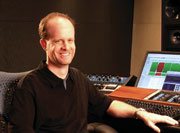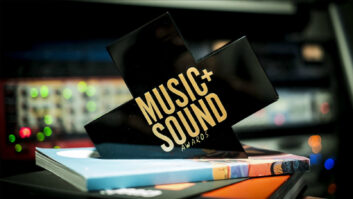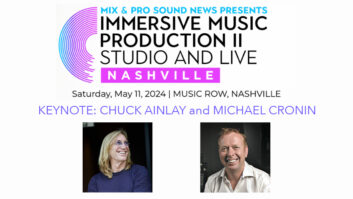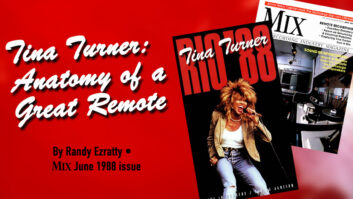
Master of Studio B, Dave Harris
Welcome to Charlotte, N.C., a traditional Southern town that has made its name as one of the nation’s banking centers, a locus for Big Tobacco “where the Bible Belt buckles.” Amid the air of conservatism, a community of recording artists continues to thrive and build careers on a national level. While North Carolina — based band Southern Culture on the Skids, perennially touring alt/country group Cast Iron Filter and local country outfits Two Dollar Pistols and Trailer Bride keep the country/rock scene going, it’s the recent surge in the popularity of punk, a local devotion to a wide range of genres from gospel to melodic hardcore and indie label support that now define the region’s music.
A steady force in Charlotte’s recording community with an eye and spirit for independently minded projects, engineer Dave Harris opened Studio B (Mastering, www.studiobmastering.com) some 14 years ago and has watched the changes take place in his city. “These days, I don’t have to say Charlotte, North Carolina. I can just say Charlotte,” he notes. A healthy flow of mastering clients, ranging from local to international artists, was the catalyst for him to grow and improve his facility, which opened in September 2003 across the street from the smaller original location. Russ Berger of Russ Berger Design Group, who had consulted with Harris about his plans five years before the actual re-design, worked alongside Harris for the duration of the project.
The new space, a “4,600-square-foot, ’60s-style, barrel-roofed warehouse” borders the city’s retail and industrial districts. “My goal was to build, from scratch inside an existing space, something that was specifically made to be the ultimate monitoring environment,” Harris says. “I wanted something that sounded great, but that was also great-looking [with] a very relaxed atmosphere. I wanted a fun place to work in every day. And it turns out that the things I like, my clients do, too.” That existing space also includes several offices in the front of the building (rented out to a studio tech, a small record label and a local music producer, among others) and 2,800 square feet of open space in back.
Measuring 19×26×12 feet (W×D×H), the mastering suite itself was constructed with heavy-duty bass traps in the corners and pyramid diffusers that double as architectural and lighting accents; RBDG also provided sound isolation on the walls and ceiling. Harris outfitted the suite with a Crookwood custom mastering console, which was built to spec four years ago and has been in use at Harris’ place ever since. “It has some routing capabilities I really like,” Harris explains. “It’s very transparent-sounding and it doesn’t get in the way — the best thing about it is that you don’t know it’s there.”
The suite is further equipped with a Pro Tools MIX system and a SADiE 5 workstation, with Dunlavy SC V monitors powered by Cello Performance II amps. Harris admits to having expensive taste in outboard gear, collecting such items as Apogee AD-8000 SE A/D and D/A converters, Manley Variable MU Tube and Tube-Tech LCA 2B tube compressor/limiters, Millennia Media NSEQ-2 Twin Topology parametric equalizer, Manley Massive Passive parametric tube equalizer, Waves L2 digital limiter, Crane Song HEDD 192 digital signal processor and an Ampex ATR-102 ½-inch analog tape recorder, which was recently restored and serviced by Mike Spitz at ATR Services.
Surrounding the mastering room, RBDG plotted out a centrally located machine room, a lounge, a kitchen and support spaces for client comfort. As Harris says, “Everyone wants to be treated a little bit like a rock star, whether they are or not.”
Harris, who started his career as a musician and moved into the recording side after attending Berklee College of Music, has worked as a mixing and tracking engineer, producer and MIDI programmer. Now he’s a mastering engineer with a healthy list of credits — from projects with members of ’90s main-streamers Hootie & The Blowfish to irrepressible rockers Southern Culture on the Skids and Reverend Horton Heat. Other clients include respected indie labels Yep Roc (Graham, N.C.), Trust Kill (Tinton Falls, N.J.) and Victory Records (Chicago); producers Bill Szymczyk (The Eagles), Brian Paulson (Two Dollar Pistols) and Steve Haigler (Hopesfall); and mixers Ed Stasium (Reverend Horton Heat) and Mark Williams (Catch 22, Cast Iron Filter).
Harris plans to stay with mastering, saying, “There’s something about the completion [of these projects] and the excitement that is there during the last day or two of the process. To experience that several times a week is fun. That type of listening to the overall picture just suits me.”
Breean Lingle is an assistant editor at Mix.







